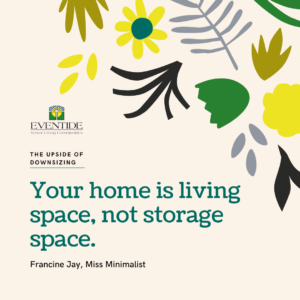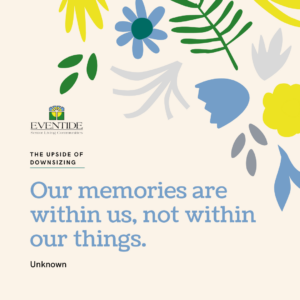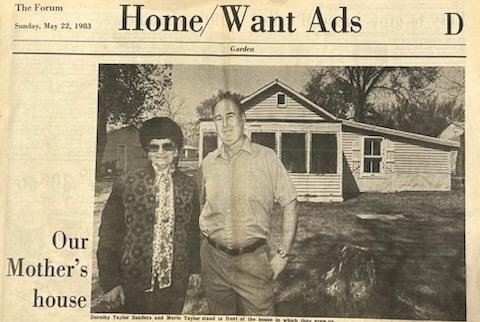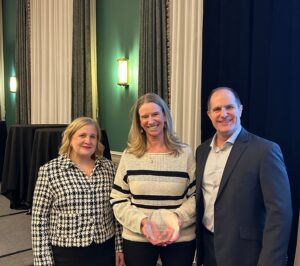Some people don’t give a second thought to throwing away a favorite old sweater or a perfectly serviceable DVD player. Others, on the other hand, become emotional at the thought of parting with the wedding china nobody’s used in three decades.
Most of us, however, land somewhere in the middle. It might be easy for us to throw away or donate that chest of drawers in the guest room, but that moldy pile of old National Geographic magazines you inherited from your grandfather? No way!
So, what happens when it’s time to downsize later in life? It’s easy to say we’ll part with the silver ladle that hasn’t been used since 1983, or Grandpa’s November 1967 issue of National Geographic, but doing it is another story.

Read more: “Ease the stress of downsizing”
The reality is, no matter if you’re a minimalist or a must-keep-it, downsizing can be good for your health and even make you happier—no matter how hard it might be in the process (and it can be difficult).
Some well-known benefits to downsizing:
- Reduces stress
- Creates healthier (and safer) living environments
- Minimizes loneliness (if you’re downsizing and moving to a retirement community or closer to family and friends)
Moving into a smaller place comes with a lot of practical perks, too, like:
- Less space = less cleaning, maintenance and decorating
- Fewer daily household chores = more time for hobbies and activities you enjoy
- Smaller carbon footprint = greener, healthier lifestyle
Of course, the simple fact that simplifying is good for your health doesn’t make it any easier to part with decades of memories and creature comforts. But there are lots of great tips out there to help you take the emotion out of the process. Let’s dig in!
Look at items logically, not emotionally
The biggest tip is to change your perspective. Look around at the items you own. Are some of them dusty or so worn out they’re hardly functional anymore? These are signs that logically, you no longer need them, but perhaps emotionally you think you do.
So, how do you hack your brain into parting with items that have a high emotional value? Here are some ideas from Good Housekeeping:
Take a photo. Have a ratty old sweatshirt from college you just cannot throw away? Take a photo and even frame it. This works great for kids’ old artwork and ticket stubs from favorite concerts.

Create a ritual. If we’re tasked with cleaning out a loved one’s home after they’ve passed, grief can really get in the way of attempts at impartiality. In these cases, grief experts suggest creating a ritual, saying a prayer, or even reciting a poem to help you emotionally release from the item. Some people even find burning special mementos to be particularly healing.
Assemble a life quilt. Take those piles of 1970s polyester pants and have someone sew a quilt or stuffed animal out of them. This will get the items out of your closet and turns them into an heirloom you can put on display.
De-own vs. declutter
Often, decluttering and organizing requires us to acquire more boxes and totes, which isn’t such an organizational hack, after all if our task is to downsize.
Becoming Minimalist, a news outlet that focuses on creating clutter-free lives, said, “organizing our possessions is an action that must be repeated over and over and over again. … At its heart, organizing is simply rearranging.”
Changing our perspective in light of downsizing requires us to remember that rearranging only organizes our clutter. De-owning, on the other hand, often gives us a chance to bring new life into the items we no longer need.

Here are practical ways to de-own your items:
Upcycle. Giving old furniture to a refurbisher to restore is a great example of upcycling. Many artisans will happily take antique furniture off your hands so they can restore it and sell it.
Recycle. Recycling cans and bottles is one thing, but did you know many items, such as shoes, can be recycled? Check with your local recycling center for more information on what they’re able to take.
Donate. Offering old furniture, clothing — even cars — to charitable organizations is an incredibly satisfying way to de-own possessions you no longer need in your own life.
Sell. Make a little extra cash at an estate sale, a community garage sale or junk market. This is a great option for people who are living on a strict budget or just enjoy money.
Throw away. As much as we all dislike adding more junk to the landfill, sometimes it just has to be done.
Simply ask for help
Perhaps the most valuable gift you can provide yourself when downsizing is the gift of asking for help.
Many professional cleaners are adept and experienced in helping people downsize. If it’s in your budget to hire someone to help, inquire on rates and get estimates from several local places before making a decision.
Friends, family, members of your church or social club might also be happy to help you clear out the garage or a basement. All you have to do is ask!
Read more: August and Irene Keller downsize and now their lives are bigger than ever
Grow bolder at Eventide
If you’re ready to downsize and looking for your next home, book a tour at Eventide and see what growing bolder is all about. From active older adult living to independent apartments, to memory care and assisted living, our communities are designed to help people live their best lives today and tomorrow. Schedule a tour!



